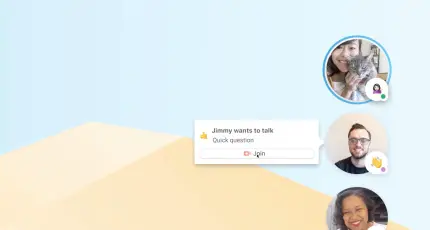One of the broader trends of the pandemic has been the unbundling of Zoom with startups pulling out a feature or two and designing entire products centered around a specific vision of remote work. One of the more tempting product ideas has been the development of the omnipresent always-on video workspace where managers can always see their directs onscreen and team members are only a shout away from getting someone else’s attention. While it’s seemed like an exciting product for the founders building those startups amid the remote work boom, it also sounded awful for the workers using the software.
Remotion
CEO Alexander Embiricos was never crazy about the idea of an always-on camera either, but he did like the idea of making it easier to build face-to-face time over video chat into a team’s culture. The startup he co-founded has been building an always-there dashboard that pins your co-workers profile pictures to a workspace taskbar on your Mac desktop.
Mouse over a team member’s profile pic bubble, click the video chat icon, send a quick chat request and get to talking over video. It’s far from a revolutionary workflow, but Remotion is aiming to build a platform that makes video calls feel like less of an event and more like a lightweight way to quickly get to the bottom of something without back-and-forth emails or
Slacks
.

Remotion CEO Alexander Embiricos and CTO Charley Ho
“Right now, when we look at teams we say, okay, we have ways to schedule meetings, and it works. We have ways to message each other, and it works,” Embiricos tells TechCrunch. “There’s no problems there that we want to fix, what we fundamentally want to change is when we use video and how we use video, making it so that you can use video informally.”
Remotion is launching their product in beta today and announcing that they’ve raised $13 million in funding, including a Series A led by
Greylock
and a seed round led by First Round. The startup is debuting its product on the heels of a historic pandemic that many believe could fundamentally shift companies away from strict office cultures towards embracing more hybrid and fully remote workforces.
“I think that the pandemic has permanently changed the way people work,” Greylock’s
Sarah Guo,
who led the Series A deal, tells TechCrunch. “I think people are disengaged in big video meetings — they just go in and multitask, and Slack is great, it’s instant and asynchronous, but… I just don’t see most companies doing distributed work in a text-first way.”
You won’t see an endless cascade of team member bubbles on Remotion, users designate favorites that sit on their desktop, and the app is largely designed around helping small teams collaborate anyway. Fittingly, Embiricos, who is based in Brooklyn, has been building Remotion with a small remote team, alongside co-founder Charley Ho, who is based in Chicago.
One of Remotion’s biggest risks is pushing users to give it a permanent home on their desktop. Users can opt to let the hub of profile bubbles hover over their other windows or recede behind them but the app is designed to leave your co-workers and their availability statuses just a glance away at most times. All of that screen real estate can be a big sacrifice to workers that might be already be dealing with more cramped workspaces than they’re used to in the office.

Credit: Remotion
The app aims to give users controls to designate when they’re heads-down, need to talk or just open for some idle chitchat. Users can set standard or custom availability statuses, quickly update profiled pictures with a Photobooth-esque feature, or let a Google Calendar integration automatically do the work in signaling what they’re busy with.
There’s a familiar danger for new workplace collaboration tools where something that was meant to help users cut back on another form of communication like emailing or Slacking ends up just adding to the noise, jamming notifications into your feed and giving you another inbox to check obsessively. Embiricos hopes that the ambient nature of just being pinned to the desktop can prevent this from becoming a problem.
“Showing up to Slack in the morning — it’s a wall of text and like eight channels you have to check,” Embiricos says. “What we’re trying to create is like, you wake up and show up in the product, but there’s nothing to check, you didn’t miss anything. It’s just the product is just there. And when someone comes online or doesn’t come online there are no notifications. If you want to know, you can glance over your team and find out.”
Remotion is live in beta for Mac with a waitlist for Windows and Linux users.
 简体中文
简体中文

